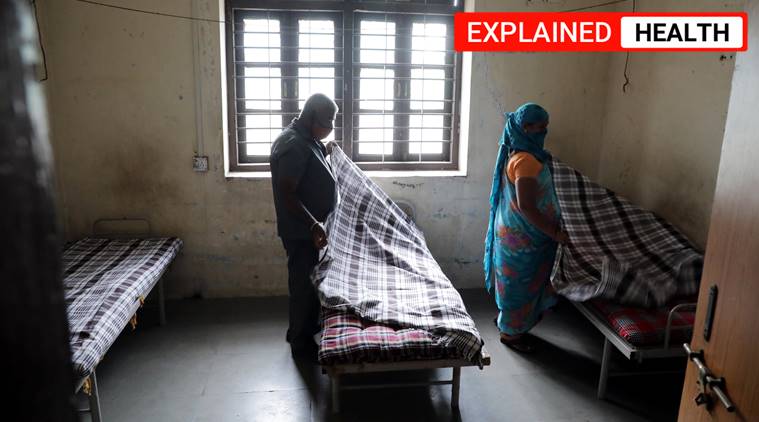Severe lung damage, blood clots: Covid-19 signatures that linger
As many patients go back to hospital after recovering from severe cases of the novel coronavirus infection, and others require oxygen support at home, doctors have been flagging several issues of concern.
 Hostel rooms are converted into Covid care centres at the Agriculture College Hostel in Pune on July 16, 2020. (Express Photo: Arul Horizon)
Hostel rooms are converted into Covid care centres at the Agriculture College Hostel in Pune on July 16, 2020. (Express Photo: Arul Horizon)
As the number of novel coronavirus infections in India surges in the fifth month of the outbreak – going past the 1 million mark on Thursday (July 16) – doctors have been increasingly reporting several relatively new conditions associated with Covid-19.
Among these conditions are lung damage, known as lung fibrosis, and blood clots in the pulmonary artery – Pulmonary Thrombo Embolism or PTE – which are seen in persons who have recovered from very severe cases of the disease.
Pulmonologists across the world have been flagging these conditions over the past few weeks as persons who have recovered from Covid-19 are going back to hospitals with breathing problems due to lung damage.
Lung fibrosis
Pulmonologists say people with severe symptoms of the coronavirus could be dealing with lung complications for years after recovery. The damage caused by the infection leads to scarring of the lungs, which has long-term impact on the quality of life.
Lung fibrosis requires home oxygenation support even after discharge and recovery. In some cases, the cardiac health of the patient may be affected – causing ‘cor pulmonale’ or failure of the right ventricle of the heart, which is a known complication of chronic severe lung disorders.
The severity of the complications depends on the extent of fibrosis, Dr A Raghu Kanth, Senior Consultant Pulmonologist at Medicover Hospitals, Hyderabad, said. Covid-19 initially attacks the lungs, leaving the air sacs filled with fluid, limiting their capacity to absorb oxygen, which ultimately leads to symptoms like shortness of breath, cough, etc.
“Some patients who had severe Covid-19 disease are facing lung complications. But it is too early to say whether fibrosis caused after recovering from Covid-19 is reversible or not,” Dr Prasanna Kumar Reddy, Consultant Pulmonologist at Apollo Hospitals, said.
“We are prescribing anti-fibrotic medicines to some of these patients. We have to reassess over a period of time how it is affecting, with CT scans being advised every two months to monitor the progress. Definitely lung fibrosis is being observed in severe Covid-19 cases but whether it will severely hamper lung function in the long run or not is still being assessed,’’ Dr Reddy said.
Dr Kanth said that several persons who had recovered from Covid-19 were already returning with lung fibrosis. “Medicover Hospital is treating such patients who have returned with problems of lung fibrosis post-Covid-19 recovery,” he said.
Early intervention with medication and follow-ups are very important in order to prevent further progress of the condition, Dr Kanth said.
📣 Express Explained is now on Telegram. Click here to join our channel (@ieexplained) and stay updated with the latest
Pulmonary Thrombo Embolism
Pulmonary Thrombo Embolism (PTE) is another pulmonary issue which is affecting people post-Covid-19 recovery, Dr Kanth said.
PTE refers to a blockage or clot in the pulmonary artery, thus preventing the blood flow through the lungs. Its prevalence has increased due to immobility and restricted activity during the course of treatment and the disease process itself, Dr Kanth said.
Dr Randeep Guleria, Director of AIIMS, told The Indian Express in a recent interview that in the beginning, doctors thought the virus was only causing respiratory infection. But now there are patients with blood clots; the virus is targeting the transport of oxygen, choking off its supply to other organs.
Covid-19 is causing a lot of systemic effects like inflammation of the inner lining of blood vessels leading to narrowing of their area, Dr Guleria said. A lot of inflammatory markers entering the blood is also being seen, which caused a hypercoagulable state that promotes clotting.
Prevention and treatment
The methods of taking care of these conditions include the administering of medications such as anticoagulants and anti-fibrotic drugs along with home oxygenation, if required.
Anticoagulants usually help in preventing the formation or enlargement of blood clots, whereas anti-fibrotics reduce the risk of acute respiratory degradation.
General preventive measures including chest physiotherapy are recommended for Covid-19 patients.



- 01
- 02
- 03
- 04
- 05


































